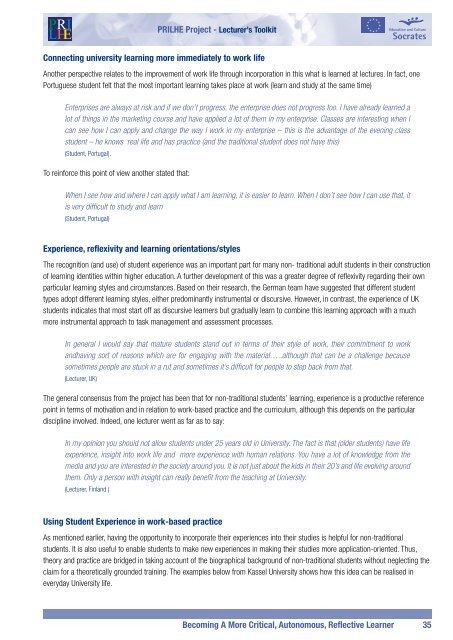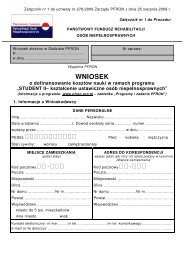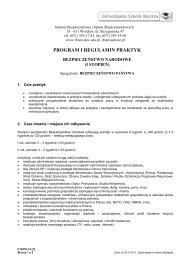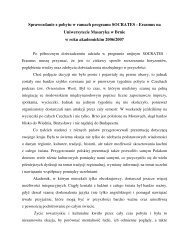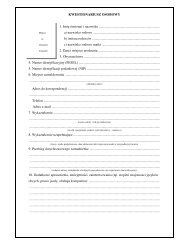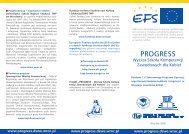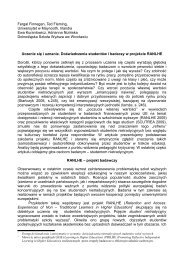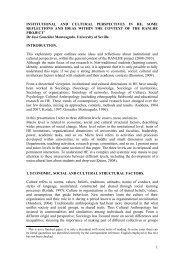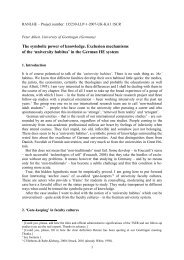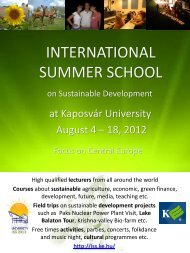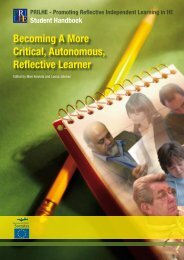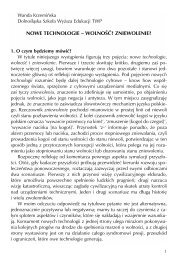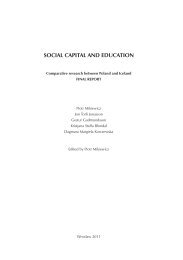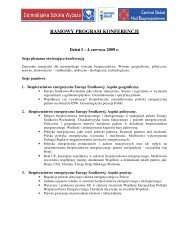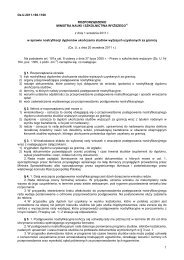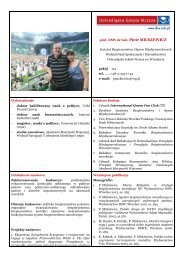Becoming A More Critical, Autonomous, Reflective Learner
Becoming A More Critical, Autonomous, Reflective Learner
Becoming A More Critical, Autonomous, Reflective Learner
You also want an ePaper? Increase the reach of your titles
YUMPU automatically turns print PDFs into web optimized ePapers that Google loves.
PRILHE Project - Lecturer’s Toolkit<br />
Connecting university learning more immediately to work life<br />
Another perspective relates to the improvement of work life through incorporation in this what is learned at lectures. In fact, one<br />
Portuguese student felt that the most important learning takes place at work (learn and study at the same time)<br />
Enterprises are always at risk and if we don’t progress, the enterprise does not progress too. I have already learned a<br />
lot of things in the marketing course and have applied a lot of them in my enterprise. Classes are interesting when I<br />
can see how I can apply and change the way I work in my enterprise – this is the advantage of the evening class<br />
student – he knows real life and has practice (and the traditional student does not have this)<br />
(Student, Portugal).<br />
To reinforce this point of view another stated that:<br />
When I see how and where I can apply what I am learning, it is easier to learn. When I don’t see how I can use that, it<br />
is very difficult to study and learn<br />
(Student, Portugal)<br />
Experience, reflexivity and learning orientations/styles<br />
The recognition (and use) of student experience was an important part for many non- traditional adult students in their construction<br />
of learning identities within higher education. A further development of this was a greater degree of reflexivity regarding their own<br />
particular learning styles and circumstances. Based on their research, the German team have suggested that different student<br />
types adopt different learning styles, either predominantly instrumental or discursive. However, in contrast, the experience of UK<br />
students indicates that most start off as discursive learners but gradually learn to combine this learning approach with a much<br />
more instrumental approach to task management and assessment processes.<br />
In general I would say that mature students stand out in terms of their style of work, their commitment to work<br />
andhaving sort of reasons which are for engaging with the material…..although that can be a challenge because<br />
sometimes people are stuck in a rut and sometimes it’s difficult for people to step back from that.<br />
(Lecturer, UK)<br />
The general consensus from the project has been that for non-traditional students’ learning, experience is a productive reference<br />
point in terms of motivation and in relation to work-based practice and the curriculum, although this depends on the particular<br />
discipline involved. Indeed, one lecturer went as far as to say:<br />
In my opinion you should not allow students under 25 years old in University. The fact is that (older students) have life<br />
experience, insight into work life and more experience with human relations. You have a lot of knowledge from the<br />
media and you are interested in the society around you. It is not just about the kids in their 20’s and life evolving around<br />
them. Only a person with insight can really benefit from the teaching at University.<br />
(Lecturer, Finland )<br />
Using Student Experience in work-based practice<br />
As mentioned earlier, having the opportunity to incorporate their experiences into their studies is helpful for non-traditional<br />
students. It is also useful to enable students to make new experiences in making their studies more application-oriented. Thus,<br />
theory and practice are bridged in taking account of the biographical background of non-traditional students without neglecting the<br />
claim for a theoretically grounded training. The examples below from Kassel University shows how this idea can be realised in<br />
everyday University life.<br />
<strong>Becoming</strong> A <strong>More</strong> <strong>Critical</strong>, <strong>Autonomous</strong>, <strong>Reflective</strong> <strong>Learner</strong> 35


